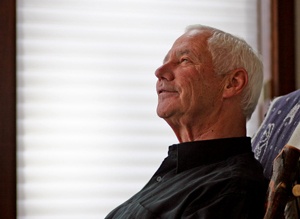Sep 14 2008
Stanley Falkow has spent his life studying how bacteria cause human disease. But ask him whose side he's on, and he's likely to pause. Or maybe not. Actually, it's been pretty clear all along-as evidenced by an experiment in graduate school that required him to feed hapless bacteria to a hungry slime mold.
 Stanford professor Stanley Falkow will receive the 2008 Lasker-Koshland Award for Special Achievement in Medical Science. Credit: Krista Conger.
Stanford professor Stanley Falkow will receive the 2008 Lasker-Koshland Award for Special Achievement in Medical Science. Credit: Krista Conger.
“I felt like a traitor,” recalled Falkow, PhD, the Robert W. and Vivian K. Cahill Professor in Cancer Research at the Stanford University School of Medicine. He was supposed to be learning more about the mold. Instead, he trained his microscope on the lucky bacterial survivors, exhibiting an affinity for microbes that has lasted more than 50 years and spawned the careers of nearly 100 students, postdocs and fellows.
The breadth and depth of Falkow's career is being recognized with the 2008 Lasker-Koshland Award for Special Achievement in Medical Science. Sometimes referred to as “America's Nobels,” the Lasker Awards are this country's most distinguished honor for researchers in basic and clinical medical sciences. The Special Achievement award, which has been renamed in honor of the late biochemist Daniel Koshland Jr., is given only once every two years to commemorate a life of scientific contribution and service. The awards will be announced Sept. 13 by the Lasker Foundation and then officially presented at a ceremony Sept. 26 in New York City. Falkow's award carries a cash prize of $300,000.
Falkow's colleagues, collaborators and students couldn't be happier about the recognition.
“Dr. Stanley Falkow is one of the most remarkable and respected scientists of our time,” said Stanford medical school Dean Philip Pizzo, MD. “His elegant research contributions to the field of bacterial pathogenesis, which he fathered, have been enhanced by his incredible leadership as a teacher and mentor for a generation of physicians and scientists worldwide.”
“There's an irreverent, playful joyfulness to the way Stanley does science,” said David Relman, MD, a Stanford professor of infectious disease and of microbiology and immunology, who was a postdoctoral scholar in Falkow's lab in the late '80s. “Everyone who meets him feels like they have a personal connection.”
Falkow's fascination with his chosen field began when, at about 11 years old, he happened upon Paul de Kruif's Microbe Hunters—a classic story dramatizing the earliest discoveries of micro-organisms by Leeuwenhoek, Koch, Pasteur and others—in his local library in Rhode Island. After reading the book, he was hooked. He arranged a deal with a nearby toy store to work in exchange for a small microscope, and promptly became a member of what was then a relatively small group of bacterial paparazzi.
Although Falkow, now 74, went on to experience most of the transformative technological breakthroughs in science, from ultracentrifugation to DNA sequencing to microarrays, he still has a soft spot for microscopy. He's most well-known for his work on extrachromosomal elements called plasmids and their role in antibiotic resistance and pathogenicity in humans and animals, but he's continued throughout his career to explore the microbe's-eye view that can only be afforded by getting down to their level.
In particular, he's fond of promoting the idea that many of the adverse effects of microbial infection are the fault of the host as much as the bacteria. “Disease is a distraction that keeps us from understanding the biology of the relationship between the two organisms,” said Falkow, who is also a professor of microbiology and immunology. “I never met a microbe I didn't like.”